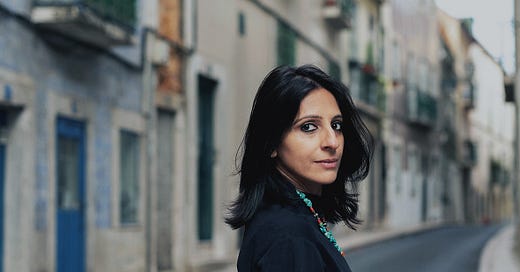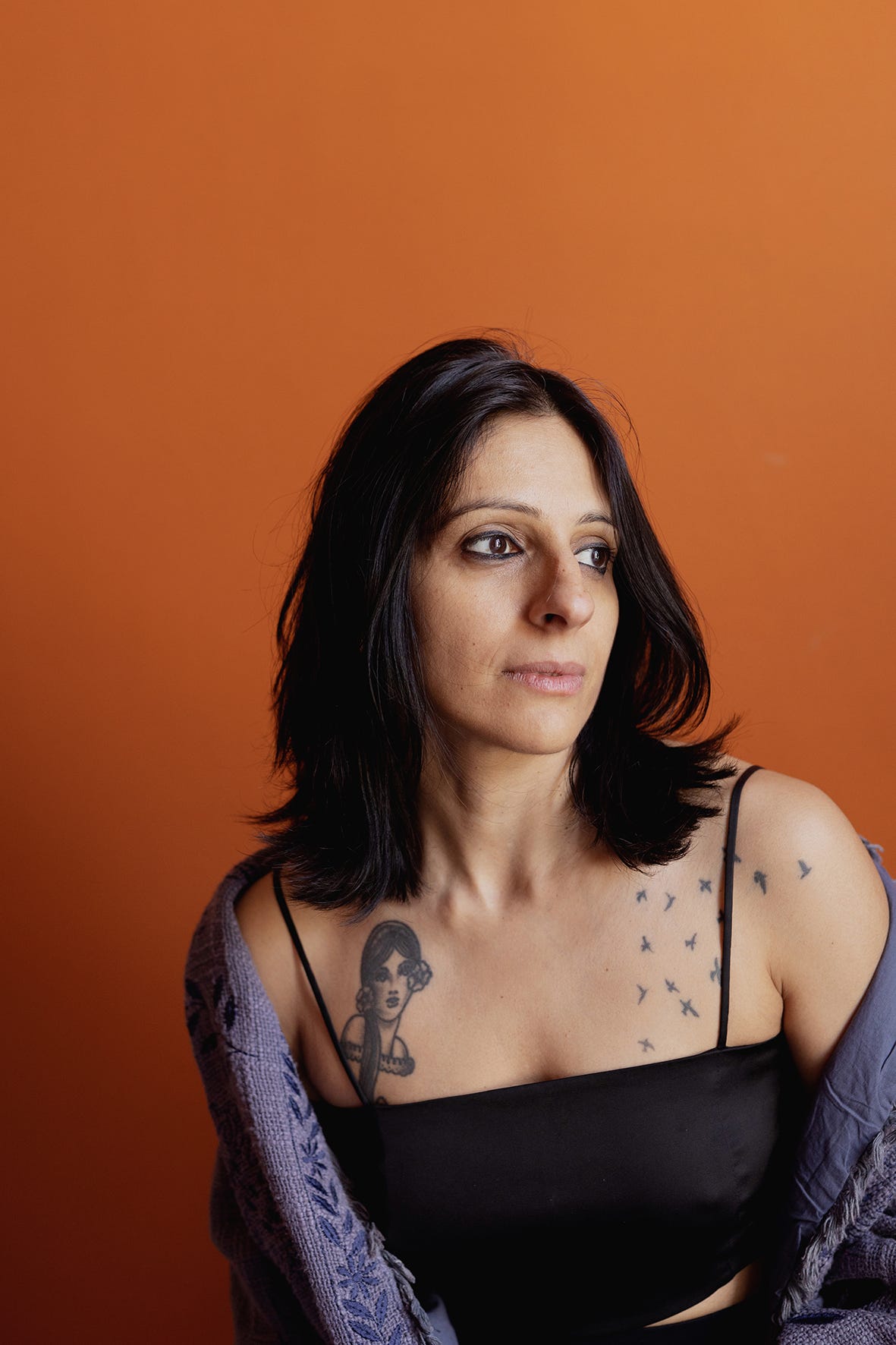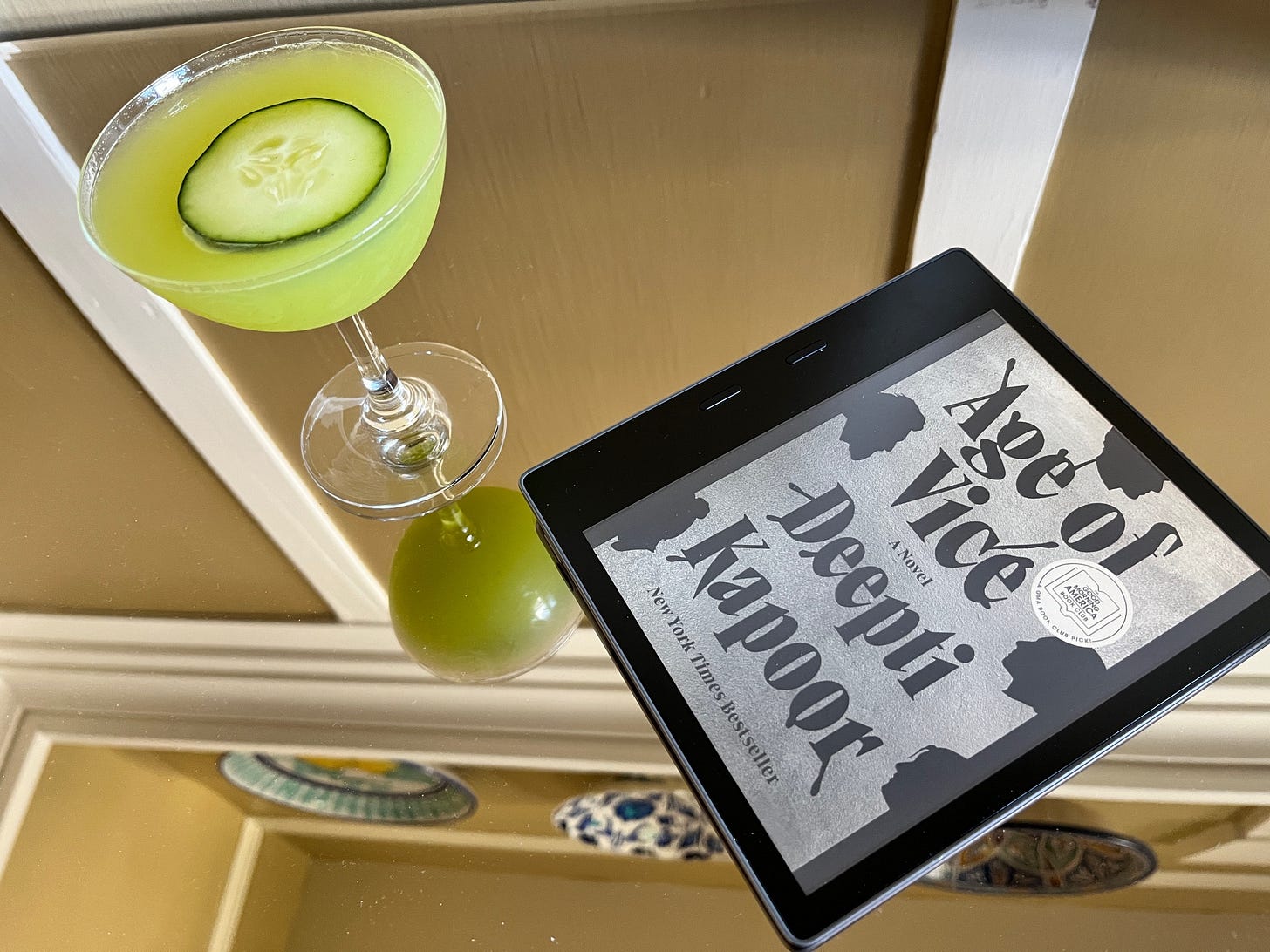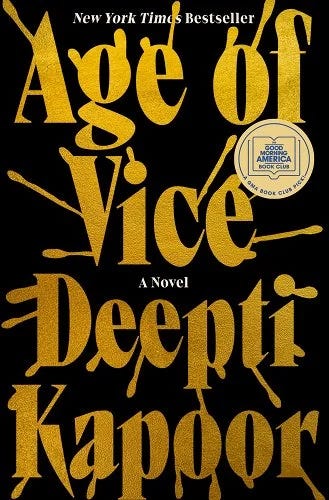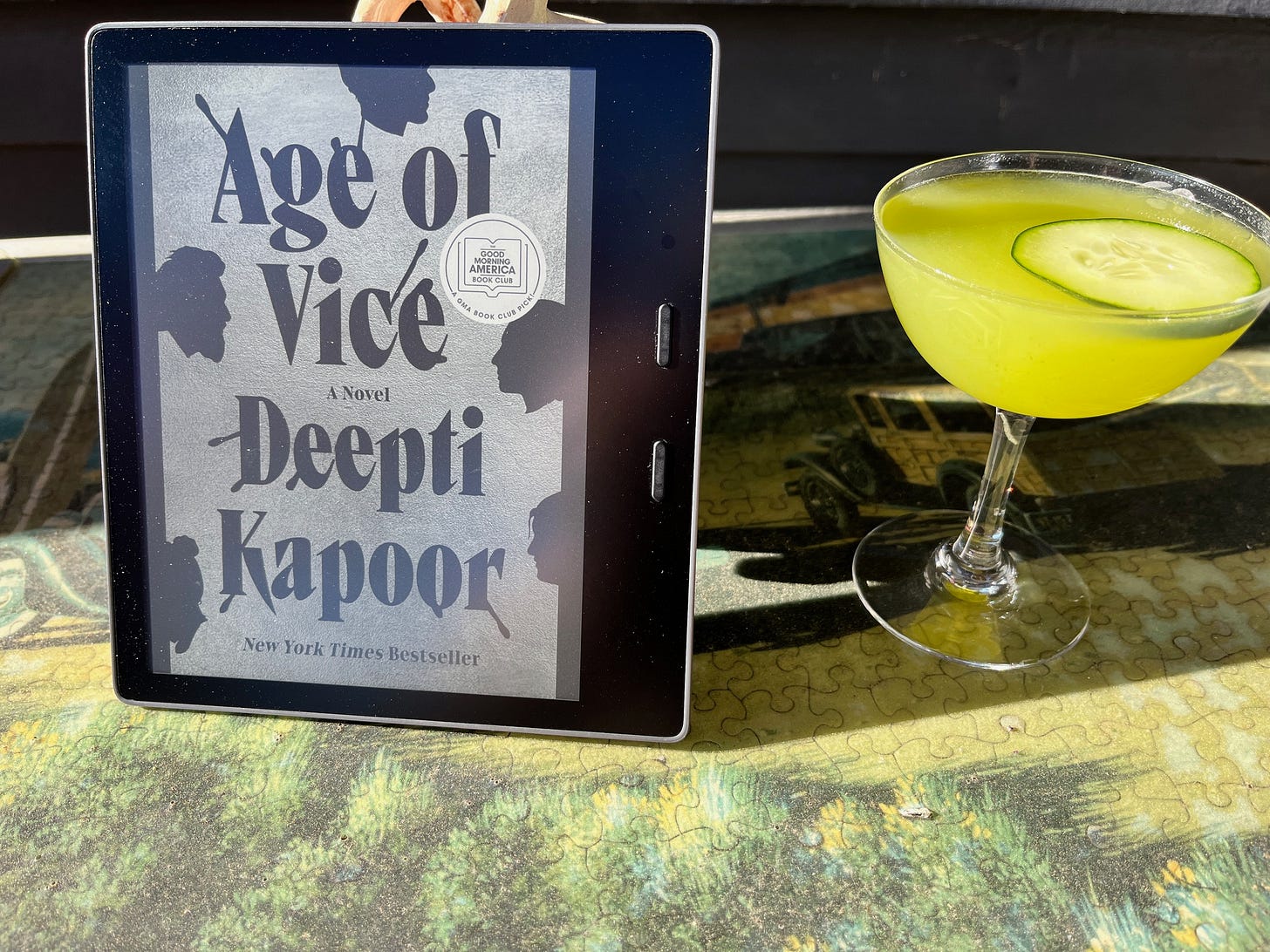Interrogation: Deepti Kapoor
A Blood & Whiskey interview with the author of AGE OF VICE.
Hello friends and readers,
I’m happy to share this Q&A with Deepti Kapoor, whose second novel, Age of Vice, I reviewed last month. Kapoor’s first novel, A Bad Character, was published in 2015, a prelude of sorts to the sprawling Age of Vice, which came out last year and earned heaps of praise for it’s take on wealth, crime, and violence in modern India. It’s the first book in a planned trilogy and TV rights have been sold to FX Studio — this would make a great a TV series.
Kapoor was born in the Uttar Pradesh state of northern India, where much of the action in Age of Vice takes place. She worked as a journalist in New Delhi and lived in Goa before moving to Lisbon with her husband.
I reached out with some questions and was glad to connect with a fellow Scrivener user and to be introduced to the Curry Gimlet.
How long did you work on Age of Vice?
Years. I’m tempted to say half my life. I’d like to say more years than I care to remember, but in truth it’s more like a bunch of years that bleed into one another and become indistinguishable until the very end. You could say it was a range between twenty years or three.
When and where did you write the book? Also how?
I started in Goa, took it to Prague for a while and did nothing but drink there. Did some more back in Delhi. But really finished it properly in Lisbon. My first novel I wrote in longhand first and pared it down, but this was simply on the laptop. A friend introduced me to Scrivener, which helped organise the work, although I often get sidetracked and obsessed by creating PDFs that look like how I want the end book to look, and also get caught up in changing the font of the title page for hours at a time. Writerly procrastination at its best!
I guess what might be unusual, but I think really isn’t, is that my husband is fully involved in the work with me. He is my researcher, editor, sounding board. He came to India in 2006. We met and he never really left and we've never really been apart. We shared one disastrous magazine job between us then fled to Goa and dropped out of society. I studied yoga and he managed to get one or two freelance jobs in advertising or photography a month and that kept us alive in the years until my first novel sold. The rest of the time was just spent thinking reading, talking, and riding motorbikes, and slowly leading to writing novels.
Was Neda informed by your time as a journalist in Delhi?
I mean, Neda is a version of me, for sure. She doesn’t have the same family background - I lived in an unfashionable and more middle class part of Delhi, whereas she has a culturally elite family who owned prime real estate. I got smuggled into that world. My father was an employee with the State Bank of India and my mother was a housewife who happened to have a Masters in Literature. She came from a more establishment family, police officers and bureaucrats, and he was a very intelligent man from a very poor background. He should have gone far, but he couldn’t get into the heights of the Indian civil service because he failed his English exam. He was posted by the Bank to Bahrain, and when the Gulf War broke out I was sent back to a boarding school. That’s where I met all the rich people, the Sunnys, the Gautams. Then I ended up becoming a journalist in Delhi. Neda is a combination of the work as a journalist and my life with my rich schoolmates, who then went on to be very powerful people in their own right. But in terms of the novel, the research I did was a case of crossing the i's and dotting the t’s, in the sense that I had lived through a lot of stories from the perspectives of the people involved, or I'd heard stories told by people, and I needed to back those lived experiences up with a bit more journalistic detail. Almost all of the characters are based on people I knew or know. Events are based on the real life of people I knew even if I wasn’t there. The main cast of characters are all living in the world somewhere in some form, unless they're already dead, of course.
Sunny tells Ajay "money’s a fucking curse" - how is that true for you?
I’m not going to shit on money. Selling the novel changed our lives. We were broke when it was being written, a close friend of ours, Max, paid our rent for the last year. At the same time, money doesn’t solve the crises of the soul, it doesn’t let you escape from yourself, and it comes with its own weight. I say this as an observer too - I know a lot of very wealthy and very unhappy people from Delhi. The wealth comes with a responsibility that can be crushing, because you are a prisoner of its expectations. You can never convince someone who is starving of this, but it is still true. The bottom line is wealth can bring stability and material comfort, but it doesn’t guarantee the least bit of happiness and it can't solve the problems of the soul. And you can definitely buy a lot of new problems.
Sunny had good taste in cocktails. Do you have a fave/go-to cocktail?
Curried Gimlet. Gin, lime, fresh ginger, fresh curry leaves (kadi patta), sugar syrup. (*see below) Our house in Goa backed onto the jungle, and there was a curry leaf plant growing wild. The house was part of an extended family compound with four brothers and their families and lots of unspoken rivalries and rules. I never saw the plant myself because it would require passing through many metaphorical gates, but the wife of one of the brothers, Sushma, who became our designated protector, cook, housekeeper, cat sitter, spy and friend, always went and took the leaves for us. Curry leaf is pungent but glorious. You mix it with gin, lime, ginger, and sugar and it’s insane. My husband thought he’d invented the drink himself until he looked online a little later and saw that it had been used in many recipes, but he did come up with it in isolation. In those years we lived without much internet. Jungle all around, vipers and pythons and leopards in the hills, ravers and hippies on the beaches. And Blue Riband, an Indian gin, which is objectively rough but was the height of sophistication to us then. Also, you can give the cocktail a feni wash. That’s my husband’s unique contribution. It’s the alcohol of the fermented cashew apple. There were home stills all over the jungle, as well as the industrial ones. One of our local grocery and liquor stores held their own feni in a giant plastic vat, and served it in a bathroom bucket in the dark little room behind the shop. It’s an acquired taste I never really acquired. Ripe and fruity and wild, but if you hate it, it's like a mix between vomit and paint stripper. Goans are really crazy about their feni, and you can't buy it outside the state, so sometimes we'll get someone to smuggle some over to us in a plastic bottle. Once we brought a bottle to a friend who has a pub bookstore. It got put up behind the bar in a proper dispenser and everyone went crazy with it. It gives a really silly wild buzz. Anyway, for the drink you give the glass a little wash of feni (as you would absinthe) before you do the regular gimlet (the ginger and curry leaf muddled with the lime). That gimlet has taken us far. It hovers around Last Word territory, too, if you decrease the gin and up the feni. Otherwise I'm a regular Negroni girl.
Book or writer who made you want to become a writer - and why?
No one person or book makes you want to become a writer, at least not in my opinion. It's not like watching an athlete as a kid and being inspired. It's more like something there inside you, always inside, creeping up on you. It's not a profession, more like a compulsion. And in truth it's more like there are books out there that are so good they make you want to stop writing, because you know there's no way you can achieve what they did. But I think there are definitely books that have come out over the years that have expanded my ideas of what's possible in writing, or rejuvenated my own creative desires. An early book that energized me was The Sheltering Sky. Then the work of Anna Kavan gave me a new sense of strangeness, with her slipstream novels like Ice. Bolaño, definitely. Murakami before that. Rachel Cusk redefined the modern novel with her Outline Trilogy, reading those three books was utterly thrilling. Svetlana Alexievich's Second Hand Time is a breathtaking achievement. But none of them made me want to write. I am just in awe of them.
What's the weirdest thing in your writing space?
I don’t personally consider it weird, but I have a digital tanpura, a drone box. It’s used by Indian classical musicians as a device to set a continuous drone accompaniment for other musicians and instruments. I used to listen to it while I wrote, but now it sits there more as a charm. It got destroyed when we shipped all our things from Goa to Delhi, and we carried it to Lisbon like a religious relic. Then we moved into a Nepali immigrant district and through the local restaurant Miteri (best momos in town!) I found an electrician who said he could put it back together and make it work. He could! But I don’t use it now out of superstition that it’ll break. I switch it on every few months though just to check, and it still gives its classic drone.
What’s the weirdest thing you googled for the book?
The weirdest thing is probably some research material about human trafficking around the Indo-Nepal border. There’s a shady company that appeared in a few mentions, a front for a front, an agency that purports to help with job placements, but is allegedly involved in the trafficking of skin — taking women over the border from Nepal into India on the pretense of jobs, then forcibly imprisoning them and cutting the skin from their backs to be used for cosmetic surgery in the big India cities. Surgeries like penis enlargements. I’m not kidding. The leads go into dead ends, the company seems untraceable, the case itself is possibly just an urban myth, though I believe the practice does take place. It’s grotesque and terrifying.
What's the best or worst writing advice you've ever received?
I find that men often get in touch with unsolicited advice. Not so much advice but they’ll tell me things like: "I reviewed you on Goodreads… I told you what I think is wrong with your novel, but I’m also telling you here." You know, they'll DM me on Instagram to tell me everything I did wrong and where I could do better. It's usually Indian male writers or aspiring writers. They think they're being helpful. As for good advice, I can't think of anything anyone ever told me. I don't hang out with writers. The good advice I get is from reading good books and figuring out how and why those writers did what they did. You're always in a private conversation with great writing.
Finally, I've started asking all writers this: where would you hide a body?
The last place they’d ever look.
The Curried Gimlet
I tried to find a recipe, and found a couple that use curry syrup or nectar (like this Bengali Gimlet). This is my take, based on Kapoor’s description above…
2 oz gin
1 oz. lime juice
chopped or grated fresh ginger
fresh curry leaf (kadi patta — I substituted cilantro)
simple syrup
Pour gin and simple syrup into cocktail shaker with ice. Muddle the ginger and curry (or cilantro) leaf with the lime juice, then add to the cocktail shaker. Shake and strain into coupe glass. I decided to garnish with a cuke slice.
Optional: feni wash (i.e. rinse the glass with feni, but you probably need to be in Goa to find feni — see above)
“No one person or book makes you want to become a writer, at least not in my opinion. It's not like watching an athlete as a kid and being inspired. It's more like something there inside you, always inside, creeping up on you. It's not a profession, more like a compulsion.”
Thanks for reading. More “Interrogation” interviews: HERE.
Feel free to like or comment below. And if you know others who might enjoy Blood & Whiskey (or need intel on disposing a body), please share:
-Neal
Find me @ Instagram; sometimes Facebook, Twitter, LinkedIn, Goodreads

